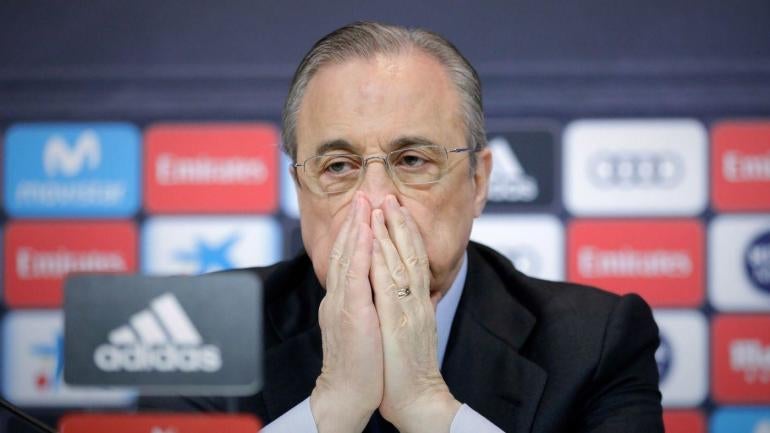
The European Super League's (ESL) seismic shock was felt beyond the European football world earlier this week
and its tremors will continue for months to come. What shouldn't be forgotten in the saga's whirlwind is that the ESL could still be legally formed and be able to compete as a third party competition despite objections by the affected European Football Governing Bodies. Despite calls from the exceedingly long list of FIFA, UEFA, The English Football Association, the Premier League, The Royal Spanish Football Federation, La Liga, The Italian Football Federation, and Lega Serie A, the Super League is an entity that could still legally exist should teams wish it to.
But just because you can legally do something, doesn't mean you should do it
On Tuesday Apirl 20 in Madrid, Spain, the ESL picked up a successful preliminary ruling in a commercial court. The ruling granted its temporary injunction which prevented the Governing Bodies from undermining the ESL's formation by announcing, threatening or preparing disciplinary measures against the football clubs or players that joined the ESL and excluding the clubs or players from any international or national football competitions such as World Cup or Champions League. The so called "Madrid Injunction" is a complicated legal finding and whether it is enforceable against any of the Governing Bodies who are not under Spain's jurisdiction. But, if ESL were to pursue recognition by courts with jurisdiction over the Governing Bodies concerning the Madrid Injunction the smart money would be on the injunction being recognized and upheld to preserve the status quo of all parties while the issues are litigated.
Craving even more coverage of the world's game? Listen below and follow ¡Qué Golazo! A Daily CBS Soccer Podcast where we take you beyond the pitch and around the globe for commentary, previews, recaps and more.
And if that's not complicated enough for you, from here the intersection of international law, fundamentals of competition/antitrust law, contract law, arbitrations, jurisdictional powers, and the 'specificity of sports' makes for a giant tangled legal knot that makes it difficult to provide a straightforward legal analysis as many of the issues. The relevant bodies that would preside over the case eventually would be the European Commission (the "Commission") and the Independent Court of Arbitration for Sport ("CAS").
Why the Commission and CAS have jurisdiction
The Commission's jurisdictional powers come from the European Union treaties which gives it the power to propose laws, implement, evaluate and update laws. Specifically, the Commission has been given unilateral power to pass competition law covering antitrust rules in the sports sector which prohibit anti-competitive agreements and practices as well as abuse of a dominant position. Relevant here, the cases determined by the Commission concern sport revenue-generating activities such as regulatory/organizational aspects of the sport.
CAS on the other hand is more well known to sports fans. This is the recognized Court, pursuant to Article 57 of the FIFA Statutes, to resolve disputes between FIFA, member associations, confederations, leagues, clubs, players, officials, intermediaries, and licensed match agents. All member associations are subject to the decision and rules of procedure in CAS.
As these two entities get involved, it's safe to say Pandora's box was open and to think it was closed over the past 72 hours is short sighted. It's entirely possible the compact between 12 of Europe's major clubs to do what was considered incomprehensible only years ago will be attempted again, albeit not in the very near future and maybe not by the same teams. There are a number of factors that gave rise to the ESL's machiavellian move, a combination of prior frustrations, pandemic instability, the burgeoning amount of debt the ESL clubs are suffering, the owners desire for revenue stability, but from a legal perspective, none is more important than the Commission's December 2020 legal decision in the International Skating Union case ("ISU").
The Formation of the European Super League Under Current Competition Law
The Commission's recent determination in the ISU case ruled that severe penalties for athletes taking part in speed skating events by third parties not recognized by the ISU are contrary to the Commission's competition law (read more here). Sound familiar? Competition law, also known as antitrust law, focuses on preventing organizations and practices which may restrict other competition in the market or abuse a dominant position. This favorable ruling was just the right legal motivation to tip the scales and give the ESL club owners confidence the courts would prohibit the Governing Bodies from implementing rules prohibiting the clubs and players in the ESL from competing in their domestic leagues, national teams or in World Cups.
Closing the Legal Loophole
The Commission's approach to sport specific anti-trust is recognized in its 2006 landmark case Meca-Medina. Meca- Medina recognized that while competition law to economic activities in the sports sector is of great importance, each sports antitrust case must be determined on a case-by-case basis because of its important social and cultural role. A body of competition law has emerged from this principle and is referred to as the "specificity of sport".
Interdependence between clubs, athletes, and competitors to compete with one another to produce a product (the sport itself)
The requirement for uncertainty as to the result for spectator interest
The need for competitive balance to fulfill the uncertainty of result
The important education, public health, social, cultural, and recreational functions it plays from amateur to professional
The requirement for the existence of one umbrella organization per national sports association which operated under a single worldwide federation
To avoid continued attempts by the ESL or future third parties from successfully forming to compete; it will be imperative for the Governing Bodies to work with the government to enact legislation that establishes objectives aligned with the "specificity of sport" to overcome the trending antitrust case law in support of competing third parties. These past couple of days has demonstrated that governments are willing to propose legislation in support of the Governing Bodies. The ESL was launched with premeditation to the legal implications; if the Governing Bodies are to learn a lesson it is that although they may have the overwhelming support of the other two important groups of people in football -- the players and the fans -- they aren't as legally grounded as they once believed to prevent competition.





















